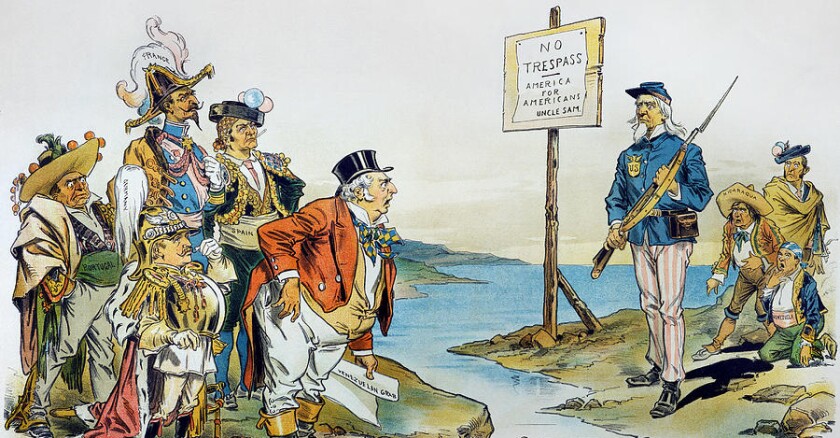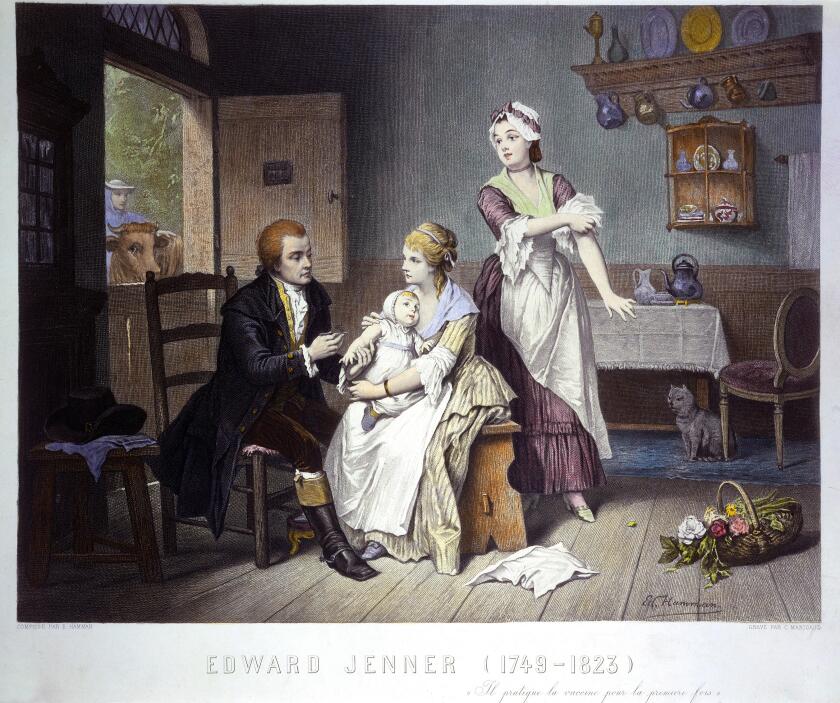In September 1796, George Washington published his Farewell Address, encouraging future generations to “Observe good faith and justice towards all nations; cultivate peace and harmony with all.” To be clear, Washington was not advocating for isolationism. He encouraged active trade agreements and recognized that the day would come when the U.S. would wage war on behalf of its interests. Until then, the U.S. should not meddle in the centuries-old conflict between European empires because the war had nothing to do with American concerns.
Washington’s successors picked up his mantle and drew further boundaries between the Western and Eastern hemispheres. In James Monroe’s 1823 annual address, he declared that the Western Hemisphere was closed to further European colonization and intervention — a principle that became known as the Monroe Doctrine. Just over 80 years later, Theodore Roosevelt issued his own corollary, asserting that the U.S. would enforce the Monroe Doctrine and maintain order as a last result, through military means if necessary.
These foreign policy dogmas are based on the geographic position of the United States. Flanked by relatively friendly neighbors in Mexico and Canada, and the vast Pacific and Atlantic Oceans, it was easy for many Americans to say what happens in Europe stays in Europe.
Until it didn’t.
In July 1914, the Great War broke out between the major powers in Europe. France, Russia, and Great Britain lined up against Germany, Austria-Hungary and Italy. Over the next two years, the U.S. supplied France and Great Britain with weapons, ammunition and equipment, but remained neutral because Americans generally wanted no part in a European conflict. As trench warfare snaked across France, isolationists referenced Washington’s words to defend inaction. In 1916, President Woodrow Wilson even campaigned with the slogan “He kept us out of the war.”
As the war on the Western Front settled into a quagmire, German leadership sought to break the British naval blockade. In early 1917, the German Foreign Secretary Arthur Zimmermann sent a telegram to Mexico, promising help with reclaiming territory in Texas, New Mexico and Arizona. Around the same time, the German navy also adopted a policy of unrestricted submarine warfare, hoping to cut off shipping to Britain. They knew that the loss of ships, lives and trade would eventually force the U.S. into the conflict but hoped they could carve out an opportunity for German forces to win the war quickly before that happened.
In Wilson’s formal declaration of war in April 1917, he described it as a battle “against human greed and folly, against Germany, and for justice, peace and civilization.” Yet, that was also true in 1914 when the war began. The Zimmermann telegram and unrestricted submarine attacks — new additions to the 20th century — demonstrated that the effects of war could quickly leap across the Atlantic. No longer could Americans hide behind the protection provided by the ocean. If war was inevitable, therefore, many observers questioned whether it might have ended sooner if the U.S. had been involved from the beginning.
Just a few decades later, when the threat of European war once again loomed on the horizon, that realization had been forgotten. Most Americans concluded that the Great War had been a colossal mistake. This time, they would not sacrifice blood and treasure for European nations that seemed determined to destroy each other. Once again, the U.S. supplied all manner of food, weaponry and ammunition to the British in their fight against the Nazis, but again sought refuge behind their Atlantic borders. It took another attack, this time by the Japanese at Pearl Harbor on Dec. 7, 1941, to force the U.S. to fully commit to defeating the Axis Powers.
When World War II finally ended in September 1945, the international community was determined to learn from the experience this time around. American participation in new institutions designed to prevent war, like the United Nations, reflected an increased willingness to engage with nations across the Atlantic. Similarly, the North Atlantic Treaty Organization (NATO) created a system of collective security to deter aggression by promising allied support in the event of an attack.
Over the next several decades, isolationist sentiment abated and increased as the U.S. over-extended itself and retrenched after conflict. The loss in Vietnam convinced a new generation of Americans, who hadn’t been alive to witness WWII, that the U.S. had no business meddling in the affairs of other nations. A similar pattern occurred a few decades later after the terrorist attacks on Sept. 11, 2001. While many Americans viewed the war in Afghanistan as just, the invasion of Iraq led to a new wave of isolationism in response to an unnecessary war.
These most recent lessons loom large in public memory, especially as most of the World War II generation have passed away. Without their knowledge and experience, younger generations have forgotten that what happens in Europe rarely stays there. In the age of rapidly advancing technology and an increasingly interconnected international community, an attack on one democracy will be felt on American shores.
Today, many Americans might think that the war in Ukraine has nothing to do with us. The war is far away, and no treaties require our involvement. Yet, the conflict is fundamentally a fight between autocracy and democracy. The remaining World War II veterans know that Ukraine might be the target today but will not be the last if authoritarianism wins. We bury our heads in the sand and hide behind the protection of the Atlantic Ocean at our peril.
Related Articles













